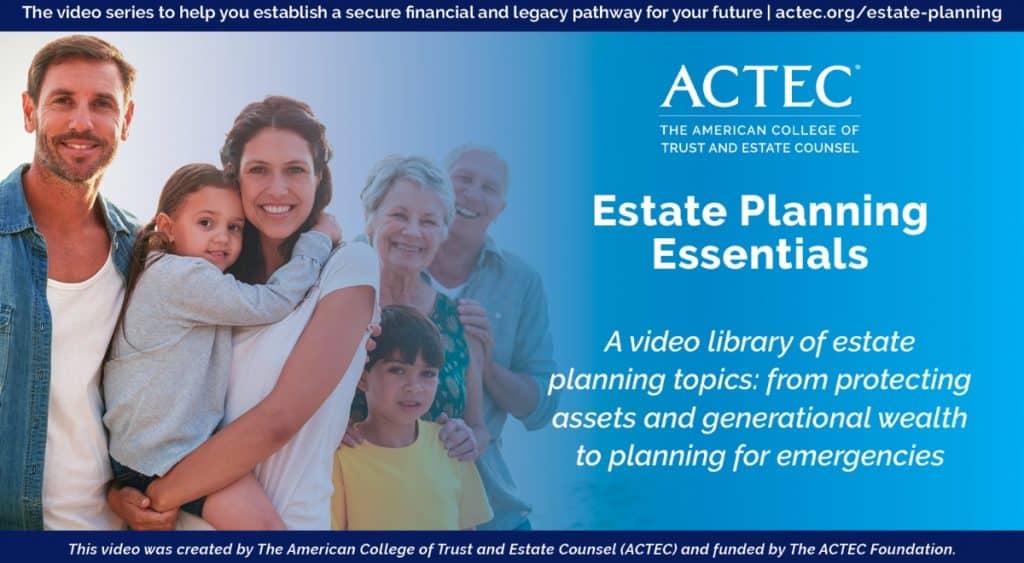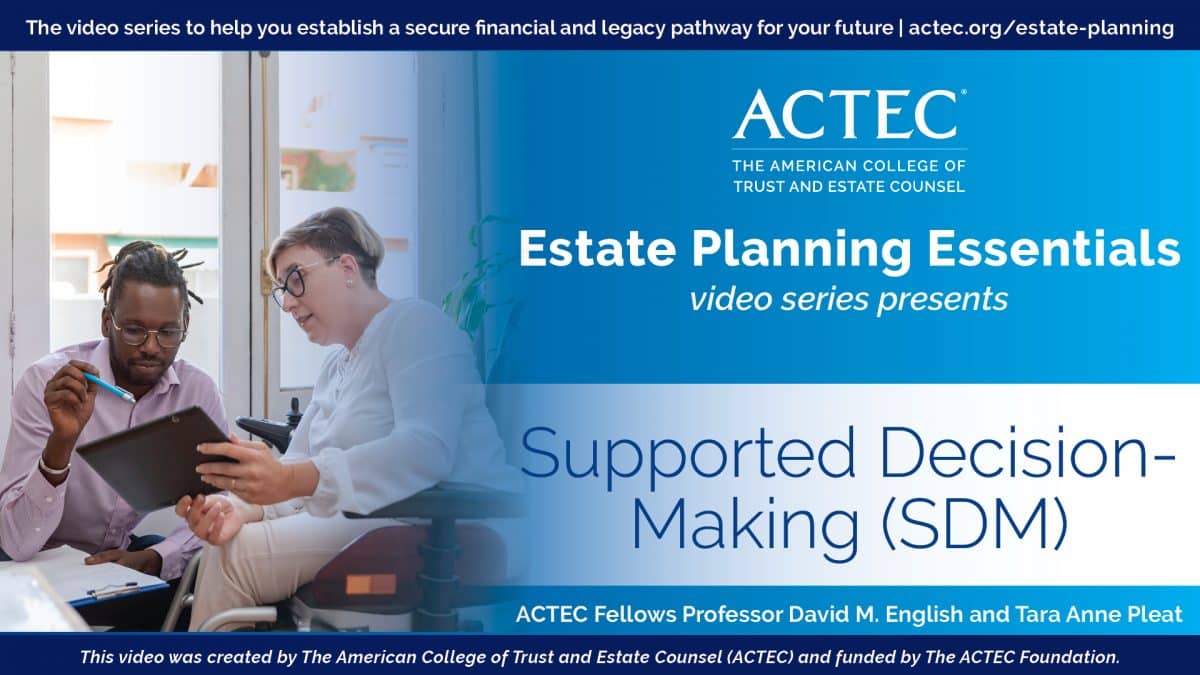What is guardianship, also known as conservatorship, and what are the alternatives to guardianship? Learn how a power of attorney, a revocable trust, medical orders, Social Security Administration’s Designated Payee, and essential communication can help determine how property and assets are handled.
ACTEC Fellows Professor David M. English and Tara Anne Pleat discuss the options and what to consider when planning for the future.
Transcript
My name is Tara Anne Pleat. I’m an ACTEC Fellow from Upstate New York and today I’m discussing alternatives to guardianship with Professor David English, an ACTEC Fellow from the state of Missouri.
David, when we talk about guardianship and it’s alternatives, we’re often looking at the concepts of a guardianship of the person and a guardianship of the property. Could you give us some examples of what a guardianship of the property would cover and what alternatives are available when thinking about that?
Guardianship of Property and Alternatives to Guardianship
Professor David English: The first thing to know is terminology is different around the country. And so, in about half of the states, the term conservator would be used but it means the same as guardian of the property. When an individual loses mental capacity, the court may appoint someone – the guardian of the property in this case – to manage their financial assets. Guardianship can be an expensive process. It can be disruptive to the family. But it is often a necessary step to take. But in many cases, there are ways of planning in advance to avoid guardianship of the property, and I’m going to mention a few of them. And the ones I’ll mention, plus many others, are discussed as well in other videos on the ACTEC website. One of the alternatives, and a very important alternative, is the power of attorney.
Power of Attorney
Every adult individual, in my judgment, should sign a power of attorney. Key question is finding someone whom the individual trusts and who they have confidence in. That’s absolutely the most important factor, really in all of the different techniques we’re going to talk about in this video. There are different kinds of powers of attorney. Professional counseling really is essential in navigating how to fill out the form and so on. But in about half of the states, the state statute is available to the as a basic form. Key thing in a power of attorney is an individual is naming someone else to make decisions for them in the event they should become incapacitated.
Revocable Trust
A second property technique in our planning device to think about is the revocable trust. For a revocable trust to work, the individual must transfer all of their assets – retitle all their assets in the trust’s name. It is not a simple instrument to create, and counseling from an expert in estate planning is absolutely essential to create a revocable trust.
Special Needs Trust
For individuals or parents of children with developmental or intellectual disabilities, a special needs trust oftentimes can be used not only for the child to qualify for government benefits, but also as a way to avoid guardianship of the property for the child.
Social Security Representative Payee
And then a final one I’ll mention, which oftentimes gets overlooked, deals with Social Security. So, if an individual receiving Social Security becomes incapacitated, the Social Security Administration will appoint what’s called a Representative Payee to receive the individual’s and manage the individual’s Social Security benefits. And Social Security, in a relatively recent change, now has the form where an individual can designate in advance who will manage their Social Security benefits if they become incapacitated. In fact, I recently filled out one of those forms for myself.
Tara Anne Pleat: So, these are at least a few ways that individuals can plan to avoid guardianship of the property. But Tara, what about personal type decisions? What are some of the ways an individual can plan to avoid guardianship of the person?
Planning Ahead to Avoid Guardianship
Professor David English: I think when it comes to the guardianship of the person and more personal and non-financial decisions, there are a host of different tools that are utilized and actually called different things around the country. I think the most common area where this issue comes up is in healthcare decision-making, especially when you’re talking about a population, an older population of individuals who are contemplating the potential loss of future capacity. And the documents that are typically utilized there are healthcare directives. In some parts of the country they’re referred to as health care proxies. In other parts they’re referred to as durable powers of attorney for health care. But typically, what they’re doing is they are designating an agent that will step in and make health care decisions on behalf of a particular patient if their attending or treating physician has made the determination that the patient can’t make those decisions on their own. And what’s interesting about those documents, at least where I come from, is the level of capacity required to execute a health care proxy or durable power of attorney for health care is relatively low. You don’t need to understand much beyond – I’m giving somebody else the ability to make health care decisions for me in a particular circumstance.
The partner document to that, and sometimes they’re encompassed in one single legal document or they’re separated – is something referred to as a living will. And that living will document is a document that really is intended to provide clear and convincing evidence of what a patient would have wanted in an end-of-life circumstance. And for individuals who have experienced those kinds of circumstances with other family members, they may have very detailed instructions or directions that they want to incorporate. (Getting Your Affairs in Order: Essential Legal Documents)
An alternative to those health care proxies, durable health care power of attorneys and living wills, is a document called a MOLST, Medical Orders for Life Sustaining Treatment. (Advance Medical Directives) That is what it sounds like. It’s a medical order; and it’s something that has to be completed in concert with a physician with the intention of giving a patient the ability to ask questions that we as lawyers often can’t answer about a particular diagnosis or prognosis that a person has. There are those documents, MOLST – that’s what I call them. I believe that they have other names around the country as well. But it’s a medical order that you can discuss with your family physician or your treating physician.
ACTEC has a video on a concept referred to as Supported Decision Making; and that is something that is used around the country, principally for the young intellectual and developmental disability population, but it can be utilized for older adults as well. And it’s being more widely acknowledged as an alternative to guardianship – where a person is finding people to help them make decisions. And actually in some instances, entering into an agreement where everybody agrees that the individual at hand is in need of some support; and outside individuals, the supporters, are agreeing to support them and help them come to their decisions, and sort of informally, and I think this goes for both the younger developmental disability population and the senior population. And it’s not a legal alternative but it’s a practical one – having active and involved family members who know what’s going on and can help when help is needed can often serve as a viable alternative to guardianship. Sometimes you can’t get around bad family chemistry. You can’t get around family disagreements, and so that won’t work. But in our experience, more often than not, in good amicable family situations, it absolutely can.
Tara Anne Pleat: David, do you have any closing thoughts on guardianship in general or alternatives to guardianship?
Closing Recommendations
Professor David English: I would emphasize that the need for an involved family is helpful, not only for personal decisions but also for property management decisions that I spoke about earlier. And one way to have an involved family is to have good communication up front. So, what oftentimes happens is an individual will sign these planning documents, and then they don’t tell their family members. They don’t tell the person whom they’ve named as an agent. And so it’s very important that the individual, when they sign the document, they communicate with the person they have chosen. These documents, by necessity, are filled with what might be looked at by many as legalese; and it’s very important that individuals communicate on a personal one-on-one level with the person they’ve chosen as their agent or otherwise, to act for them.
Tara Anne Pleat: Thank you, David, for that discussion, and for more information about this and other topics, please visit actec.org.
Featured Video
Supported Decision-Making
Experts on supported decision-making explain how this alternative to guardianship for individuals with disabilities works and answer questions families may have
ACTEC Estate Planning Essentials

ACTEC Fellows provide answers to frequently asked trust and estate planning questions in this video series.



